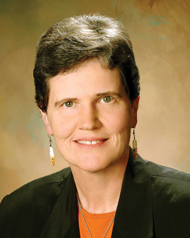View From the Administrator:
What’s in a Term? Considering Language in Our Field
By Pamela S. Hyde, J.D.
Do you ever think about what you say when someone asks you to describe SAMHSA’s work or to describe our field?
Do you ever use the words mental health, addictions, substance abuse, prevention, behavioral health, or substance use disorders? Were you ever asked to explain why you use the words you use to describe our field or SAMHSA’s work?


Pamela S. Hyde, J.D., SAMHSA Administrator

Since arriving at SAMHSA, I have been asked to explain or stop using certain words. Obviously, people are listening closely to find out SAMHSA’s priorities and how I will lead.
Click here to see some of the terms I’ve heard about so far. Do they sound familiar to you?
One thing everyone agrees on, including me, is that nearly every term we use is problematic. We need to find a way to talk about prevention, health, disorders, disease, addiction, illness, and recovery so that we can address the issues and not argue about what we mean. We definitely need to use “people first” language regardless of how we describe people with symptoms, illnesses, addictions, or diseases and how we label their status.
To clear the air, I have no favorite term or terms. At times in my professional life, I led the charge on “people first” language, and I worked with other advocates to change the words “patient” and “client” to “consumer” when that seemed cutting edge. I stood with individuals who wanted to be called addicts and with persons who just wanted to be called Joe or Jane.
I worked with others to embrace the journey of recovery and the many individualized pathways that journey takes. I argued against the notion that simple behavior change could solve all this; that our field is the only place in which behavior out of the norm is what leads to treatment and services more than an individual’s need. I also called people on their inappropriate use of language such as referring to a policy as “schizophrenic” or a person as
a “lush.” And I will continue to do so.
I know language matters. However, what really matters is that we not get distracted, not fight among ourselves, and not make assumptions about motives or beliefs based on the current language we use. We need to engage in the discussion, but not write one another off when we do not agree. We need to ensure we are respectful of all people, whether they are pro-12 step, anti-psychiatry, service providers, or service recipients. It is what we have in common, not what we may disagree on, that makes us strong as a field.
Let’s have a discussion about terms we use. Let’s try to agree on terms we could use and terms we should absolutely not let anyone get away with using about our field or the people we serve on their road to recovery.
We need to communicate well together and with others, so we need to understand together “what’s in a term.”
Click here to see the list of terms.

Let’s have a discussion about the terms we use. Let’s try to agree on terms we could use and terms we should absolutely not use.
Your comments and suggestions are critical as we move this conversation forward. In addition, how can we engage others about this without being disrespectful or making assumptions about bad intentions?
Send comments to dialogue@samhsa.hhs.gov. We will provide some feedback about what you think in a future edition of SAMHSA News. By communicating well together and with others, we will understand together “what’s in a term.”